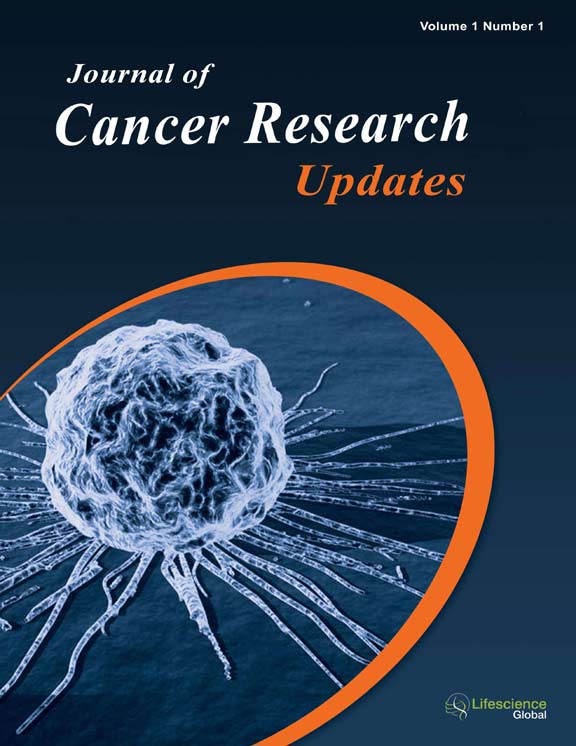jcru
Abstract : EDITORIAL: Recent Advances in Genetic Mutations of Prokaryotic and Eukaryotic ABC Transporters
|
|
Download Full Article |
Abstract : Unveiling the Unpredicted and Uncontrolled Metastasis of Cancer Cells: A Minireview
|
|
Abstract: Cancer as an historical disease is known to occur since several hundred years and still prevails till date as one of the most feared diseases. Its occurrence and/or progression are considered as the outcome of the series of accumulated ocogenic changes in the cell those transform it from benign to invasive or metastatic. It has been observed that most of the metastatic cancers are not curable and the available drugs focus on steadying the tumour growth to prevent further metastasis. Metastasis remains the cause of around 90% of the cancer deaths. Fundamental understanding of metastasis and recent advancements in metastasis driven cancer research may help to strengthen and bring in practice the new and advanced approaches for cancer treatment. In view of this, we review in detail the molecular mechanism of metastasis, problems in diagnosing and treating metastasis, and recent developments in cancer biology. Future efforts in order to unveil the unpredicted and uncontrolled metastasis of cancer cells have also been summarised. Keywords: Cancer, Metastasis, Cancer stem cells, Cancer therapeutics, Cancer diagnosis. Download Full Article |
Abstract : Recent Advances in Understanding the Structure and Function Relationship of Multidrug Resistance-Linked ABC Transporter P-glycoprotein
|
|
Abstract: Mammalian P-glycoproteins (P-gp) are members of the broad family of ABC transporters and play important physiological roles in establishing physical barriers that limit access of toxic compounds and thus in the pharmacokinetics of these compounds. Cancer cells exploit the presence of P-gp to fend off anti-cancer drugs, rendering them multidrug resistant (MDR). Structural investigations of P-gp involve the expression and isolation of this large integral membrane protein in high quality and in sufficient quantity for it to be amenable to electron microscopic (EM) and crystallographic studies. EM studies have defined the shape of the molecule and delineated its various conformations in solution but major breakthrough in obtaining atomic resolution structures of P-gp were accomplished by X-ray crystallography. Structures with increasing resolution and accuracy in various substrate and inhibitor bound forms are available for analysis and novel mechanistic insights have been obtained. These advances have paved the way for future research to further our understanding of the mechanism of P-gp function and development of potential inhibitors that may reverse MDR in cancer treatment. Keywords: P-glycoprotein, ABC transporters, Multidrug Resistance, Mechanisms, Structures. Download Full Article |
Abstract : EGFr, FGFr and PDGFr: Emerging Targets for Anticancer Drug Design
|
|
Abstract: Number of cancer affected individuals are increasing day by each year, 11 million people are diagnosed with cancer out of which 7.6 million people die of this deadly disease which is a very significant figure in worldwide mortality. It has been estimated that there will be 16 million new cancer cases every year by 2020. Despite tremendous chemotherapeutics are given to treat cancer toxicity appears to be the most seminal point which can kill normal body cells along with abnormal cancerous cells. Therefore, researchers have been devoted to discover less toxic new chemotherapeutics which can prevent damage to the normal tissues. Recent advancements in molecular biology of cancer and different pathways involved in malignant transformation of cells clearly demonstrate that one of the important mechanisms for progression of cancer is abnormal signal transduction via tyrosine protein kinase. Tyrosine kinase catalyzes phosphorylation of tyrosine residues in proteins. The phosphorylation of protein residue results into the functions of protein. Tyrosine kinase function in many signal transduction cascades wherein extracellular signal is transmitted through the cell membrane receptors (EGFr/FGFr/PDGFr/C-src) to the nucleus where gene encoding this receptor protein maybe modified by this signal. Mutation of gene may causes abnormal signal transduction and leads to the progression of cancer. Therefore EGFr, FGFr and PDGFr have become the emerging targets for development of promising anticancer leads having lower toxicity. The present review is an attempt in this direction dealing with various aspects of cancer, molecular pharmacology of EGFr, FGFr and PDGFr tyrosine protein kinases which has a direct bearing on the design and development of newer chemotherapeutics. Keywords: Cancer chemotherapy, EGFr, FGFr and PDGFr as emerging drug targets, Anticancer Drug Design. Download Full Article |






















